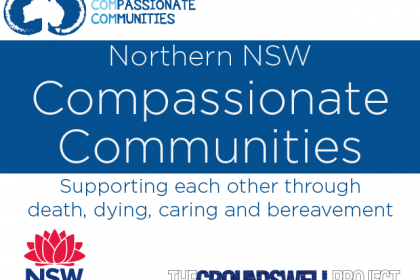
The Northern NSW Compassionate Communities group, lead by Anna Law, End of Life Care Project Lead for the LHD planned a stall in Ballina to help the community consider their future medical care and understand the importance of advance care planning.
The stall was set up in Ballina Fair in April as part of National Advance Care Planning Week 2019.
Passers by were given the opportunity to discuss what living well means to them and learn how plans can be made today to provide a medical care road map for tomorrow.
“We want to help people prepare for a time when they may be too sick to speak for themselves and consider a scenario where family and doctors are left to make tough decisions. Advance care planning can give people a voice, ensuring they remain in the driver’s seat, regardless of what the future brings,” says Anna.
With an ageing population, advance care planning is becoming an increasing priority for both the community and health sector. As it currently stands less than 15% of Australians have documented their preferences in an Advance Care Directive, despite the fact that 50% of people will be too unwell to make their own end-of-life decisions.
Medical Director of Advance Care Planning Australia, Dr Karen Detering is delighted to see the local community getting behind the initiative.
“It’s great to see groups like the Northern NSW Compassionate Communities helping people to take a more active role in their future health care. We hope that this event helps empower the people of Ballina to speak up about the kind of care they want, and ensure their preferences are heard and respected, now and into the future,” says Dr Karen Detering.
What is advance care planning?
Advance care planning promotes care that is consistent with your goals, values, beliefs and preferences. It prepares you and others to plan for future health care and a time when you may no longer be able to communicate those decisions yourself.
Key facts about advance care planning
- Almost 50% of people will not be able to make their own end-of-life medical decisions
- Less than 15% of Australians have documented their preferences in an Advance Care Directive
- A third of Australians will die before the age of 75
- Most people die after a chronic illness, not a sudden event
- Research shows that advance care planning can reduce anxiety, depression and stress experienced by families and that they are more likely to be satisfied with their loved one’s care
About Advance Care Planning Australia
Funded by the Australian Government, Advance Care Planning Australia is the national authority on advance care planning. The organisation supports the general public and healthcare professionals to ensure people’s values and medical care preferences are heard and respected.
